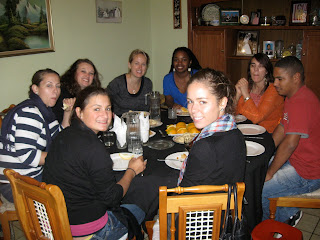My first two weeks in Cape Town have been unbelievable. First, we took a tour of the townships, seeing some of the roughest, most impoverished slums on the outskirts of the city. Highlights included meeting a traditional healer, sampling fresh homemade beer out of a communal tin bucket, seeing a local woman cook sheep heads on an outdoor fire, and getting our hands dirty over a lunch of Braai (afrikaans for barbeque) meat and paap.
 |
| The traditional healer in his "office" |
 |
| Sheep heads- apparently you eat the skin. Sadly, they weren't ready for us to sample. |
 |
| home-brewed beer |
 |
| Langa homes |
 |
| latrines in Langa |
Later, we visited the Bo-Kaap, the vibrantly colored muslim district of Cape town perched on the side of table mountain with gorgeous views of the water, ending our tour in one of the homes with a delicious meal cooked by our local hostess, Habiba.
 |
| lunch at Habiba's |
 |
| the Bo-Kaap |
 |
| about to go inside the mosque |
Aside from these highlights, we also went to the Ubuntu festival in honor of Nelson Mandela's 92nd birthday, visited the District 6 museum, and explored UCT's gorgeous campus and the surrounding community nestled at the foot of the breathtaking Table Mountain. So far, I see why so many come to visit Cape Town and never want to leave.